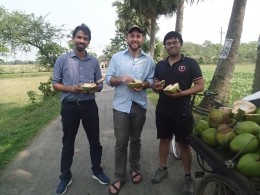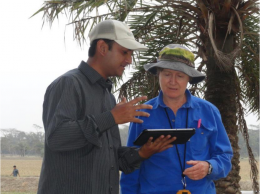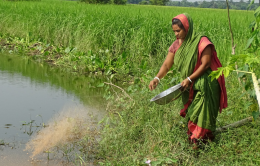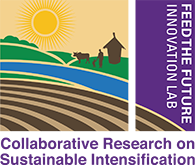
Poor road networks, waterlogging, canal networks, and undulating topography are considered barriers to agricultural mechanization in this coastal region. Additionally, the limited agricultural mechanization that does exist in the coastal zone, mostly two-wheeled tractors, are mainly operated by men. Most farmers in the polders cultivate a single low-yielding rice crop in a year, and agriculture is considered as a low-input, low-risk business. Generally, poor and landless women are engaged in the annual rice harvest on family-cultivated land and on neighboring farms as wage-earning day laborers. During rice harvest, which is done mostly in December, women can work for up to 8-9 hours daily.The rapidly growing economy of Bangladesh has fueled demand for labor in non-agricultural sectors, resulting in a scarcity of rural agricultural workers. This has driven wages up and is affecting farm productivity and profitability. Although women have always played a critical role in the agricultural sector, their identity has historically been only that of unpaid family labor, with the widespread perception that women’s roles in farming are limited to the homestead and some postharvest operations. However, in the polders of the coastal zone, women are involved in almost all agricultural activities, in addition to all their other household duties. The women also face several constraints, such as restricted access to inputs, resources (land and labor), assets (machinery and equipment), and services (extension and advice, financial loans), which restrict them from playing a leading role in most activities.
As a part of the SIIL (Sustainable Intensification Innovation Lab)-Polder Project, mechanical harvesting, using a reaper, was introduced to small and marginalized farmers to ease the physical burden on women and increase their contribution to household earnings. The project organized hands-on training, in collaboration with the ACI Motors Ltd., on using the reaper for 450 men and 377 women for three cropping years from the 2016 monsoon season to the 2019 dry season. The team then worked closely with four women who showed a strong interest in learning how to use the reapers as a business venture. The project purchased one reaper for them to work with. Of these, two, Nomita Golder and Madhuri Mondal, actually used the reapers as a way to make additional money in the first year (Fig. 1). In a follow-up interview with the women, they provided additional information on how the use of mechanization improved their livelihoods. For example, Nomita worked 22 days during the previous season to manually harvest rice paddies and she earned BDT 6,000 (USD 72). Using the reaper not only reduced her drudgery, but also saved significant time. Both young women reckoned that it generally took 48 hours to manually harvest a 1-acre paddy field while it could be harvested in only 3 hours with the reaper. With the time saved and the money earned using the reaper, the women were able to contribute to their respective family’s income by buying and raising livestock and poultry and by providing child care services or tutoring the children of neighboring families in addition to their harvesting activities.
As the project has only one machine, which was used extensively for training and demonstrations at an early stage of the harvesting period, Nomita and Madhuri were able to use the machine for only a few days to provide harvesting services to other farmers. In order to accommodate the lack of additional reapers, the women, instead of harvesting all day, both decided to work in the field during the morning hours only, which was sufficient for them to harvest the area that they used to harvest in 5 to 6 days. In the afternoons, Nomita could then continue providing child-care services to neighborhood families. Using the reaper helped her earn money in a shorter time while continuing other income-generating activities. Madhuri spent the extra time on family care and some time for herself. Having some leisure time has significant implications on women’s health and well-being. Spending more time on family care, particularly children, contributes significantly to overcoming the household’s nutrition and health challenges.
After assessing the interest of women, the project purchased one more reaper and provided Madhuri Mondal and Shipra Biswas to harvest paddy in the subsequent years (Nomita Golder was not able to continue service provision after 2016 due to poor health). Madhuri Mondal was able to earn BDT 82,838 (USD 1035) after five seasons and while Shipra’s net income in four seasons was BDT 62,688 (USD 784). Due to less drudgery, they devoted more time in mechanical harvesting to earn more for family’s welfare. Madhuri used her earnings for children’s education, daughter’s marriage and purchasing a cow that is providing nutrition to her family; while Shipra used the earnings to get back her father’s (deceased) mortgaged land, purchased goats and a sewing machine with which she started a tailoring business.
Although there is a long way to go, mechanization has shown promise in helping increase household income, reducing women’s drudgery, and improving their health and overall household well-being. Without mechanization, women either need to spend significantly more time on manual harvesting as wage laborers to meet the expenses of the family or reduce their family expenses, which might include stopping the education of their children or limiting other important family needs.
The success of this service provision model using mechanization depends on awareness, training, and access to credit to purchase machines, among other aspects. Although the capital needed to purchase the machines is seen as a major limitation, it can probably be addressed through pooled community investment in conjunction with existing organizational structures such as water management groups or through loans from self-help groups/ NGOs. Linking these groups to financial institutions might also be an option in the future. The government has introduced about 50 to 70% subsidies to acquire agricultural machinery. Linking women to these subsidies will help empower them and move the country closer to ensuring food security and better family health.
Rokhsana Parvin Ratna, Sudhir Yadav, Manoranjan Mondal, Ranjitha Puskur, and Krishna Jagadish
Reprinted from: Polder Tidings V2(2) page 8-9.





